|
Cult of the Supreme BeingCulte de l'Etre Supreme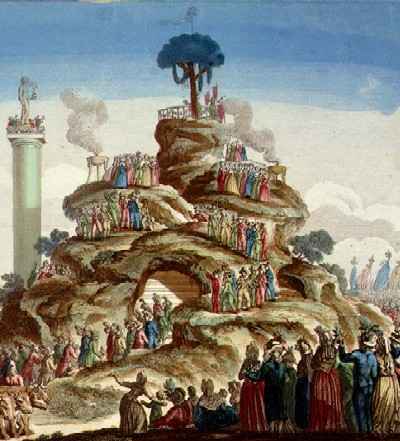 When you think of the French Revolution, you think of Marie Antoinette, Maximilien Robespierre and plenty of guillotines.
When you think of the French Revolution, you think of Marie Antoinette, Maximilien Robespierre and plenty of guillotines. What you may forget about is the official state-sponsored religion. The Cult of the Supreme Being is exactly the kind of religion you might expect a committee of government bureaucrats to produce—generic, efficient and completely uninspired. Throughout the history of France, religion and monarchy went together like wine and cheese, or more often like hellfire and brimstone. The Roman Catholic church had collaborated with French kings on such indignities as the slaughter of the Cathars and the betrayal of the Knights Templar, both of which were naked power and money grabs carried out under the pretext of religious conviction. It followed naturally that when the French turned their attention to eradicating the monarchy, starting in 1789, that the priests would be the first ones up against the wall. Voltaire, a French philosopher, had spent most of the 18th century mercilessly dissecting the intellectual underpinnings of religion and the corruption he found rampant in the Catholic church. A rationalist and an elitist, Voltaire felt religion was a good way to keep the base impulses of the rabble in check, but he advocated a theory of Deism for the upper classes. Deism is a philosophical approach to religion that concedes the existence of a creator god, but stipulates that he/she/it exerts no influence over human affairs or the physical universe (an argument designed to circumvent logical objections to free will in a universe run by an all-powerful god).
When the French Revolution began, a few years after Voltaire's death, one of the first orders of business was to eradicate the church on French soil. In 1789, the revolutionary assembly officially banned the church. The government seized church property and the property of clergymen on behalf of the state, and the new constitution painted freedom of religion into a very small corner—"No one shall be disturbed for his opinions, even religious, provided their manifestation does not disturb the public order established by law." Priests were required to take loyalty oaths to the state, and allegiance to the pope was forbidden. New priests could only be elected by the community—in the municipal sense, and not by parishes of like-minded believers. Priests' salaries were set and paid by the state. Within a year, the restrictions became more severe. Priests who refused to take the loyalty oath were arrested, and only loyal priests were permitted to preach, and eventually even to worship. Riots broke out as government forces killed priests who were too visible in their resistance. The Revolutionaries were influenced by philosopher Jean-Jacques Rousseau's concept of a "civic religion," and they began institutionalizing some religion functions within the state. In 1792, the pope raised the stakes by excommunicating all priests who aligned themselves with the Revolution. By the end of 1792, the government was looking on even the "loyal" priests with disdain, and fresh squabbling broke out over the Revolution's attempt to legalize the marriage of priests and institute a new calendar system with a metric calendar that cut back Sundays (called decadi) to one day in every ten, during which a civil church service was held.
The cathedral of Notre Dame was looted and converted into a Temple of Reason. By now, the various factions of the Revolution has begun splintering into subsects, such as the Cult of Reason, an atheistic celebration of the glories of human intelligence. Antireligious activity in France continued to rise in both volume and severity, and the tales began to reflect badly on the Revolutionary Council. Around this time, Robespierre became the leader of the Revolution as it stood. He helped institute a period known as the Reign of Terror, aka The Year France Went Completely Batshit. In addition to executing thousands of his opponents, Robespierre decided that the godless Cult of Reason and the current state of the official French religion were causing foreign policy problems. Fortunately, Robespierre had a solution. Unfortunately, his solution was as fucked-up as everything that preceded it. In April of 1794, Robespierre proposed a new state religion, the Cult of the Supreme Being. Rejecting atheism, the new Cult was based around the worship of a Deist-style creator god. Unfortunately, the Cult lacked virtually every quality that makes a religion last—history, a preceding religion on which to draw, actual enthusiasm among the religion's members, a ritual structure grounded in some sort of mystical tradition, a charismatic spiritual teacher and a set of clearly drawn beliefs.
The Supreme Being had few distinguishing characteristics relative to the colorful gods of yesteryear, such as Zeus, Jesus Christ or Shiva. He was opposed to priests and kings, but very much in favor of Liberty, much like Robespierre himself. He also...
...impels the just man to hate the evil one, and the evil man to respect the just one. It is He who adorns with modesty the brow of beauty, to make it yet more beautiful. It is He who makes the mother's heart beat with tenderness and joy. It is He who bathes with delicious tears the eyes of the son pressed to the bosom of his mother. It is He who silences the most imperious and tender passions before the sublime love of the fatherland. It is He who has covered nature with charms, riches, and majesty. All that is good is His work, or is Himself. The Supreme Being's turn-ons include linking "all mortals by a boundless chain of love and happiness". His turn-offs include "tyranny, crime, and imposture". By virtue of their participation in the Revolution, the French automatically qualified as "worthy to honor Divinity". The festival of the Supreme Being was set on June 8, 1794, or whatever the fuck that translates as in metric. Robespierre considerately laid out an elaborate series of joyless, mandatory observances, which largely involved everyone dressing in uniforms with the colors of the new French flag and marching around in strict formation. After a speech by the president, Atheism was to be burned in effigy. According to some accounts, Robespierre's speech—now considered one of the important political speeches of the day—was greeted with hoots and jeers by his extremely bored congregation.
The Cult of the Supreme Being stands as an extremely rare example of a theistic civic religion wholly manufactured by government officials. Many nations (before and after) have attempted to enforce some sort of state-endorsed religion, but even the Caesars were smart enough to integrate their deification into a previous tradition. Depending on how you want to look at it, the Cult of the Supreme Being can be seen as a testament to either the ingenuity of the French or the megalomania of Robespierre. Either way, after Robespierre was ousted and sent to the guillotine, the Cult's brief and rather underwhelming glory immediately launched on a short trip to oblivion. Despite the institution of the metric calendar, many French continued to celebrate Sunday services for the religion of their preference. The Revolutionary government briefly maintained a lock on civic institutions like marriage, which were only permitted to be held on the decadi. But it didn't take long for the whole thing to collapse.
Although he dominated the Revolutionaries politically, Napoleon wasn't able to crush all their ideas. He took his time consolidating his power. The metric calendar continued until 1805, but Napoleon set about restoring the church more expeditiously. Napoleon believed that the Catholic Church was an effective tool for keeping the little people in line, and he struck a deal with Rome which allowed him to keep the church property seized by the Revolution, while re-establishing Catholicism as the primary religion of the land (albeit on a tighter leash than before the Revolution). Although the Festival of the Supreme Being remained on the Revolutionary calendar, for as long as it lasted, the Supreme Being was never again offered a spectacle so worthy of His notice.
|
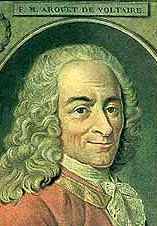 Voltaire believed the ultimate force of the universe was reason, the cognitive ability of the human mind. This credo was taken to the next natural level, atheism, by many of his contemporaries, who had been significantly shaped by their hatred for the institution of the church, as well as possible affiliations with the
Voltaire believed the ultimate force of the universe was reason, the cognitive ability of the human mind. This credo was taken to the next natural level, atheism, by many of his contemporaries, who had been significantly shaped by their hatred for the institution of the church, as well as possible affiliations with the 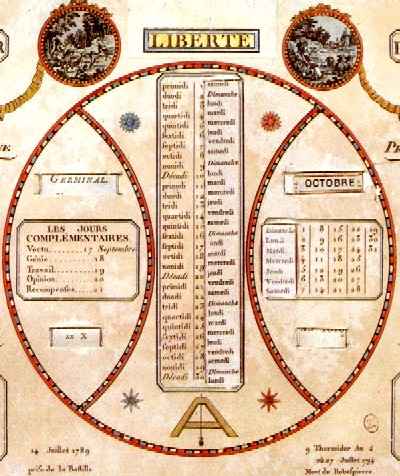 Officially launched in 1793, the calendar also replaced the Christian holidays with metrically timed feast days commemorating Labor, Reason, Virtue, Genius, Rewards and, finally, the Revolution itself. If you're thinking, "mmmm, festive," you may have been born into the wrong century.
Officially launched in 1793, the calendar also replaced the Christian holidays with metrically timed feast days commemorating Labor, Reason, Virtue, Genius, Rewards and, finally, the Revolution itself. If you're thinking, "mmmm, festive," you may have been born into the wrong century. 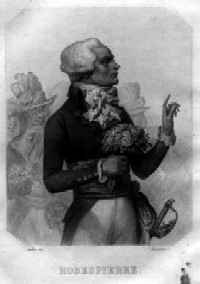 Nevertheless, Robespierre was rather pleased with himself: "Never has the world which He [the Supreme Being] created offered to Him a spectacle so worthy of His notice," he crowed in a turgid 1794 speech instituting the religion.
Nevertheless, Robespierre was rather pleased with himself: "Never has the world which He [the Supreme Being] created offered to Him a spectacle so worthy of His notice," he crowed in a turgid 1794 speech instituting the religion. 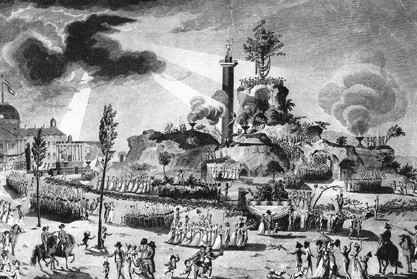 The only tenets of the Cult were that the Supreme Being existed and that man had an immortal
The only tenets of the Cult were that the Supreme Being existed and that man had an immortal 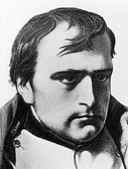 When the French general
When the French general